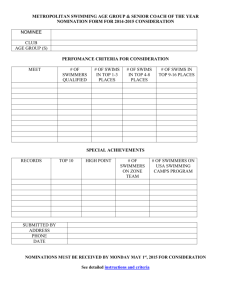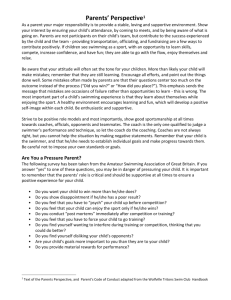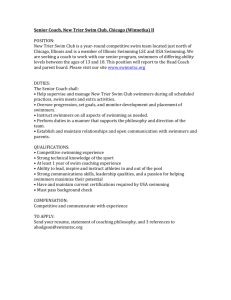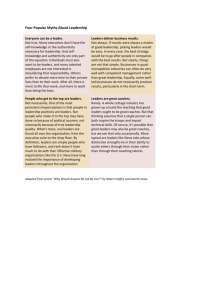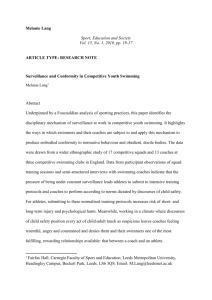Document 7840399
advertisement
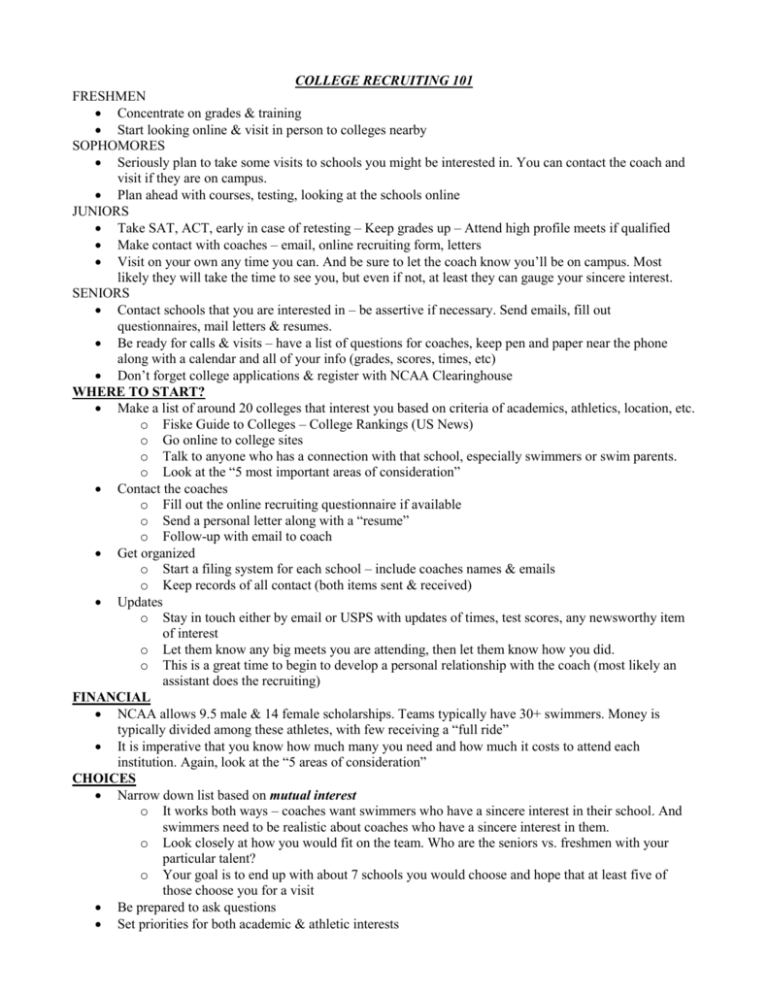
COLLEGE RECRUITING 101 FRESHMEN Concentrate on grades & training Start looking online & visit in person to colleges nearby SOPHOMORES Seriously plan to take some visits to schools you might be interested in. You can contact the coach and visit if they are on campus. Plan ahead with courses, testing, looking at the schools online JUNIORS Take SAT, ACT, early in case of retesting – Keep grades up – Attend high profile meets if qualified Make contact with coaches – email, online recruiting form, letters Visit on your own any time you can. And be sure to let the coach know you’ll be on campus. Most likely they will take the time to see you, but even if not, at least they can gauge your sincere interest. SENIORS Contact schools that you are interested in – be assertive if necessary. Send emails, fill out questionnaires, mail letters & resumes. Be ready for calls & visits – have a list of questions for coaches, keep pen and paper near the phone along with a calendar and all of your info (grades, scores, times, etc) Don’t forget college applications & register with NCAA Clearinghouse WHERE TO START? Make a list of around 20 colleges that interest you based on criteria of academics, athletics, location, etc. o Fiske Guide to Colleges – College Rankings (US News) o Go online to college sites o Talk to anyone who has a connection with that school, especially swimmers or swim parents. o Look at the “5 most important areas of consideration” Contact the coaches o Fill out the online recruiting questionnaire if available o Send a personal letter along with a “resume” o Follow-up with email to coach Get organized o Start a filing system for each school – include coaches names & emails o Keep records of all contact (both items sent & received) Updates o Stay in touch either by email or USPS with updates of times, test scores, any newsworthy item of interest o Let them know any big meets you are attending, then let them know how you did. o This is a great time to begin to develop a personal relationship with the coach (most likely an assistant does the recruiting) FINANCIAL NCAA allows 9.5 male & 14 female scholarships. Teams typically have 30+ swimmers. Money is typically divided among these athletes, with few receiving a “full ride” It is imperative that you know how much many you need and how much it costs to attend each institution. Again, look at the “5 areas of consideration” CHOICES Narrow down list based on mutual interest o It works both ways – coaches want swimmers who have a sincere interest in their school. And swimmers need to be realistic about coaches who have a sincere interest in them. o Look closely at how you would fit on the team. Who are the seniors vs. freshmen with your particular talent? o Your goal is to end up with about 7 schools you would choose and hope that at least five of those choose you for a visit Be prepared to ask questions Set priorities for both academic & athletic interests TO REMEMBER Be realistic o Not all schools have “auto admits” for athletes. Can you get into this college and can you keep your GPA if admitted? o Where do you fit on the team? Would rank in the top three of their depth chart in at least one event? Keep an open mind o Be willing to look at more than just a handful of schools. There are a lot of great universities that you may have never heard of because their football team isn’t ranked or on TV each Saturday in the fall. o There are great Division II & III schools who would love to have you and make you feel special. The coaches are just as impressive. Look at sample times on last page for Championships. o With HOPE, you would be foolish not to look at all the schools in our own state. Coaches want swimmers who want to be there o There are hundreds of swimmers who are just as fast as you are, even faster. You have to stand out by showing these coaches that you want to be there. Initiate contact and continue with follow through. o A coach is much more likely to be interested in you if you show sincere interest in them. Grades do count o It does matter what courses you take in high school and what your grades are. Coaches want swimmers who remain academically eligible. o Some schools won’t even bring you in for a visit if they feel you cannot pass admission standards. o If the grades or test scores are not there, you will need to find a college that is right for you academically. Four years of swimming vs. four years of quality education o Don’t think that the only place you can be happy is a big name school. There are a lot of great schools!!! o When your four years are up, be sure you’ll come out of a college with a diploma that will lead to a solid future – whether grad school or job placement. If you were not swimming, would you choose this school? The education should be first! Big fish or little fish – What is your comfort level? Do you want to contribute from the beginning, set a school record, eventually score at conference? Or are you content to be a part of a huge program that is nationally ranked even if you are a non-scholarship athlete? There is no right or wrong answer, just what is right for you COLLEGE SWIM MEETS Get an idea of how many swimmers actually participate in the meets vs. how many are on the team – Typically 25-40 on the team, 18-20 travel, 18-20 at conference. Many only swim exhibition Dual meets & invitationals (similar to high school) There is a difference between being on the team (doing all the workouts) and participating on the team (going to travel meets, relays at conference, etc.) VISITS Five official visits are allowed. o Again, it works both ways. Don’t waste trips to schools you know you won’t choose. o Ask enough questions to be sure you don’t waste trips to schools which don’t have you near the top of their list. Schools typically bring in WAY more swimmers than they have slots for. o Clarify ahead of time where you fall in their priority list. An official visit does not guarantee a place on the team nor does it mean there will be any money available through scholarships. Keep records after each visit, especially if you are taking all five. o Make notes on the flight/drive home about the school, the coaches, the team, the facility, etc. o Write down any questions you have for the coach o Be sure to send a thank you to the coach and your hosts! THINGS TO ASK COACHES SWIMMING Coaching style for you (sprinter, distance, etc) Training (co-ed, dryland, other types) Current swimmers in my events – what would you see me swimming What kind of scholarships might be available Pool/facilities - Athlete dorms Recruiting weekends – when would I know – How many do you typically bring in Spring/summer training - Winter training trip ACADEMICS Do I meet the minimum cutoff for admission Strength and caliber of school program in your desired field of study Financial aid - Academic advising, required study halls WEBSITES Free College Directory: www.utexas.edu/world/univ/alpha/ Links, info, message boards: www.collegeswimming.com NCAA Clearinghouse: www.ncaaclearinghouse.net Recruiting system info: www.Recruit-Me-.com For a PDF copy of the recruit me now info, email Ginger: ptcswim@hotmail.com BOOKS Fiske Guide to Colleges Sports Scholarships by Dion Wheeler The Best 361 Colleges (Princeton Review) Looking Beyond the Ivy League by Loren Pope JUST A SAMPLE TO GET PERSPECTIVE 2006 NCAA Champs Div. I Women EVENT 1st 8th 50 Free 100 Free 200 Free 500 Free 1000 Free* 1650 Free 100 Fly 200 Fly 21.63 47.41 1:43.96 4:40.01 22.44 48.78 1:46.96 4:43.69 Div. II Women 1st 8th Div. III Women 1st 8th 23.34 50.58 1:51.32 4:49.44 24.02 52.46 1:53.57 5:03.42 23.32 50.99 1:49.02 4:55.24 24.20 52.41 1:53.81 5:01.47 10:00.18 10:25.18 15:49.48 16:15.23 16:57.99 17:29.78 16:56.71 17:17.59 51.56 1:53.78 53.74 1:57.78 53.82 2:02.63 57.61 2:08.01 55.45 2:00.15 57.81 2:06.30 I. II. III. IV. V. THE FIVE MOST IMPORTANT AREAS OF CONSIDERATION ACADEMICS A. Does this school have a solid academic reputation? B. Upon graduation, what % of the students get jobs in your field of study or continue on to a strong graduate program? C. In order to gain experience, are summer internships or employment available in your field of study? D. What % of student-athletes graduate? What % of swimmers graduate? E. Is tutoring available or academic counseling available? ATHLETICS A. Do you like the staff and team? B. Are you choosing the appropriate level of competition for yourself? C. Can you make the travel team? (Top 18-21) D. Will you be able to compete in the championship meet? (Top 18-21) E. Does the history of the staff and team meet your needs? F. Is this level of training intensity what you are looking for? Yardage? Type of training? G. Of what value is the swimming program to the athletic department, the community, and the state? H. Do you want a coed or a separate training environment? I. Are you aware of the coach’s strengths and weaknesses? J. If the program is not coed, what is the relationship between the men’s and women’s program? K. Can you fit in socially with this team? L. What type and amount of strength training is available? M. How many practices per week are required? How much travel is required? i.e. – Time away from classes? N. Is there a Christmas training trip? How much will it cost? O. What are the goals of the program? P. What is the possibility of dropping the men’s or women’s program? GEOGRAPHIC LOCATION A. Are you looking for a metropolitan or rural college setting? B. If that is important to you, can you afford the cost of travel to and from home for holidays? C. Do you like to travel home for the weekend or to have family and friends come watch your competitions? Consider the distance from home. D. Weather – is the sunshine and warm weather important in selecting a college? FINANCIAL A. Can you afford this school? B. What type of aid or financial assistance is available? Consider: Grants; Student Loans, Work Study, Departmental Aid, Academic scholarships, Athletic scholarships C. What does it take (times) to receive an athletic scholarship? D. How much athletic scholarship might you qualify for? (Percentage) E. Can I earn an athletic scholarship, or increase my current one, through improved performance? INSTITUTION SIZE A. What size school are you looking for? B. Which type of school will you thrive in?

